Here's the game you didn't know you needed to play
Electricity distribution networks are complicated. So are the games based on them.
The ACTU Price Gouging Inquiry holds a blowtorch to the energy industry, highlighting the predatory pricing tactics used across the industry and how it is impacting the Cost of Living in Australia.

Welcome to Issue #18 of Savings as a Service, the monthly energy savings newsletter from Bill Hero. This month, we're diving into the recently released Report from the ACTU Inquiry into Price Gouging and Unfair Pricing Practices, chaired by ex-ACCC Chairman Allan Fels, who, in a refreshingly frank take on the energy industry has said, "the electricity industry is riddled with questionable prices".
He goes on to say a hell of a lot more in the full Report about the bad behaviour and predatory pricing practices that are rife across the energy industry.
This is a wide-ranging inquiry into a fundamental 'policy gap' in Australia where firms are free to charge whatever they like to their customers, providing that there is no unlawful collusion between them. Free market economists would argue that it's perfectly OK for firms to charge what they like - if a customer doesn't like the prices, they can buy from a competitor or not buy at all.
Unfortunately, in Australia, there is limited competition and concentrated pricing power across many markets, including for essential services like energy, where there is no option to 'not buy at all'. In these conditions, there is no real barrier to price gouging.
Firms are free to charge as much as they like. They can price gouge lawfully as long as there is no unlawful collusion. This has given rise to a policy gap – there is no set of government policies about excessive prices.
In the absence of real competition, argues Fels, we need policy intervention to address price gouging and the cost of living crisis.
There is currently a gap in government policy. It does not pay sufficient attention to high prices. It needs to. It needs to investigate and expose their causes and, as far as possible, remedy the problems: ineffective competition, vulnerable consumers, and exploitative business pricing practices.
Energy gets special attention in this report:
Of great concern is price gouging in the electricity sector, a very concentrated industry at all levels. ... there has been routine price gouging at the generator wholesale level ... There are also practices in the energy derivatives market which require deeper probing by ASIC. ... At the tranmission level there has been a history of setting prices too high ... At the retail level there is very substantial price discrimination between business and consumers which is hard to explain on the basis of cost differences.
Energy is a uniquely influential commodity because it's a core input cost for virtually all goods and services, so rising energy prices have a direct inflationary effect across the entire economy.
On top of all these systemic issues that lead to higher energy prices, there is a further problem where most consumers are still unable to easily identify the best available prices in the market:
There are also major problems for consumers in determining what are the best prices in the retail market and much more activity is required to get competition and good prices in retail.
Bill Hero subscribers will know this is exactly the problem that Bill Hero solves. Sign up now, and we'll solve this problem for you, too.

Not a subscriber yet? What are you waiting for! Never overpay for energy again! Bill Hero automatically compares every bill to help keep you always on the best priced plan.
Feature Article
The Australian Energy Regulator’s (AER) latest Wholesale Markets Quarterly Report has revealed that in 2023, average annual wholesale electricity spot prices fell by up to 64%, and average annual east coast gas market spot prices fell by 43%.
Both electricity and gas prices during the quarter remained well below the record prices of 2022 and were now closer to longer-term annual averages.
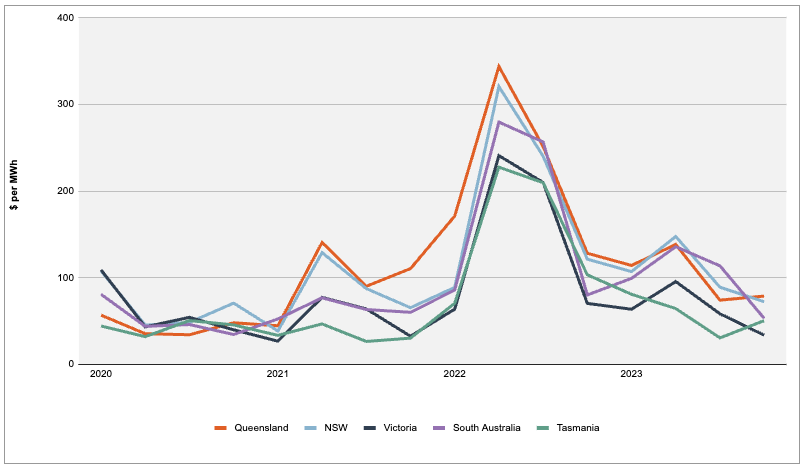
In this report, the AER blithely comments that:
Once retailers’ wholesale costs adjust to the lower prices going forward, prices faced by consumers should reflect these lower costs.
Pardon me while I snort into my coffee cup.
Economics 101 teaches us that in a perfect market, retail prices should fall after a reduction in wholesale costs. Clearly, the Australian energy market is far from perfect because, at Bill Hero, we've observed that energy retailers will pass through wholesale price increases immediately, but strangely, they are always much slower to pass on wholesale price declines 🤔.
Allan Fels' Price Gouging report calls out this particular issue as 'Rockets and Feathers', where wholesale price rises lead to an immediate 'rocket-like' retail price increase, but wholesale price declines translate much more slowly into a 'feather-like' descent in retail prices. The report also digs into other kinds of predatory pricing practices that exist in energy and other industries.
The ACTU Inquiry into Price Gouging and Unfair Pricing Practices, released on 7 February 2024, brings a refreshingly direct analysis of the exploitative pricing practices that are routinely applied across many industries in Australia:
At Bill Hero, we have consistently pointed out how many of these practices apply in the retail energy market. Our particular favourites are the 'four horsemen' of the retail energy price apocalypse:
Let's see what the Price Gouging report has to say on these issues as they relate to the energy markets.
It's good to see our old friend, the Loyalty Tax, appear in yet another official investigation. Readers of Savings as a Service will be very familiar with this one, since we bang on about it all the time.
It's telling that the Price Gouging Report chose the energy industry for its case study on Loyalty Tax, since energy is one of the industries that most overtly relies on overcharging existing customers.
The report quotes the earlier ACCC Electricity market monitoring inquiry that we also discussed in last month's newsletter, which found that energy retailers have managed to apply Loyalty Tax so effectively they have completely undermined the so-called 'safety net' of default offer pricing:
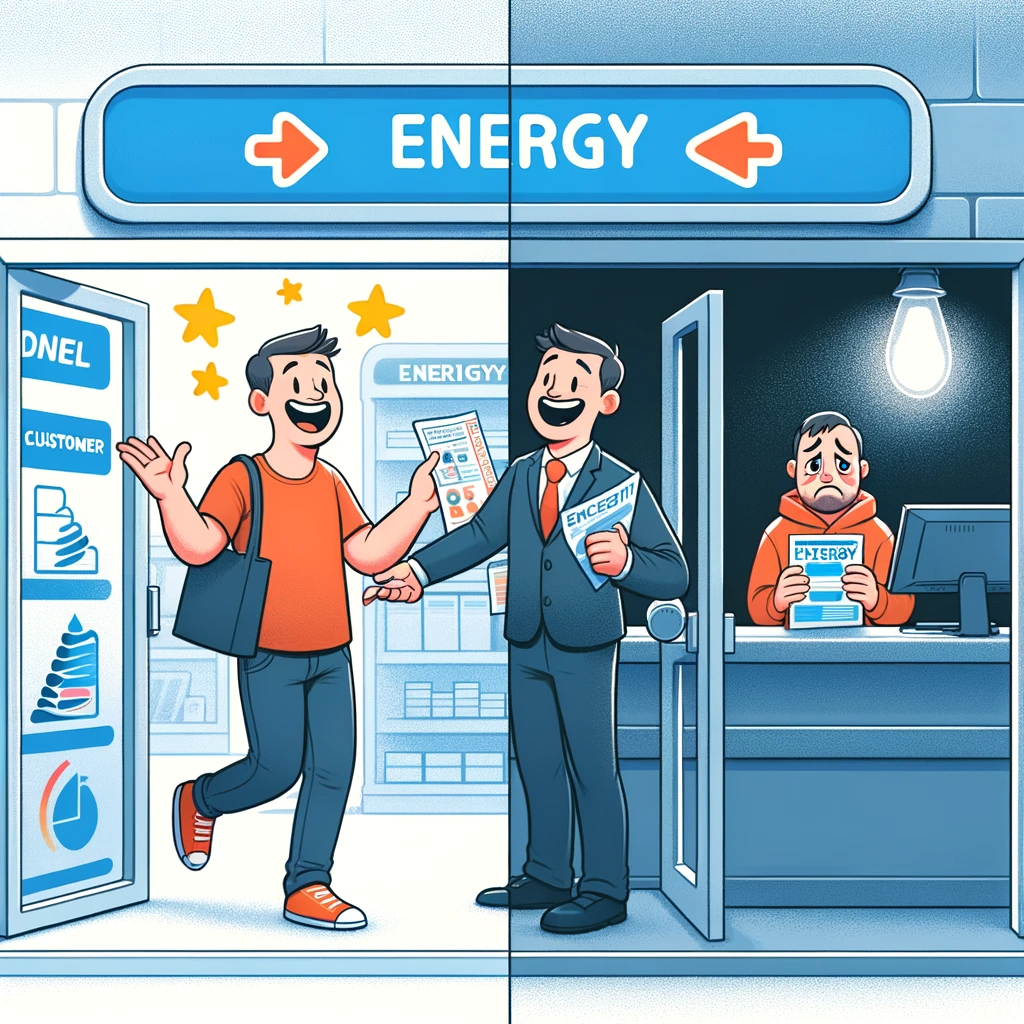
The December report of the ACCC Inquiry into the National Electricity Market (Electricity market monitoring inquiry December 2023) found that existing customers pay a loyalty penalty leaving them hundreds of dollars worse off every year. ... customers on old plans are paying higher average prices than those on newer plans. ... retailers recoup their costs over a customer’s lifetime, by setting attractively low acquisition offers and making subsequent unilateral price increases for their existing customer base over time’ (Bill Hero emphasis)
On the Confusopoly front, the report has this to say:
While electricity is a homogenous product that defies differentiation, the terms on which it is made available for sale are a case study in obfuscation. Part of the retail strategy seems to be making understanding as hard as possible so as to discourage genuine comparisons.
The electricity oligopoly has long engaged in this activity. Retailers deliberately and manipulatively seek to confuse consumers with complex price structures and plans, making it very difficult to compare between options or to judge the fairness of any specific plan or offer.
The timing of price rises and price falls is very often asymmetric. That is, when input costs rise, retail prices will rise immediately, but when input costs fall, retail prices are much slower to respond.
The Price Gouging report calls this the ‘rockets and feathers phenomenon’. Price increases are like rockets that ascend with great speed, and price falls are like feathers that float slowly back down.
We're witnessing this play out in the retail energy market right now. Wholesale costs are back to about the level they were before the price shocks of 2022, but retail prices remain dizzyingly high.
Price discrimination is when different customers are charged different prices for the same product by the same firm. Under the competition law, it is generally not illegal to charge different prices to different customers, except in the narrow case of ‘predatory pricing’.
The report highlights a discrepancy where AGL, based on data in its own annual report, is seemingly charging residential customers more than business customers for the same energy:
AGL needs to explain why consumers are paying $60.10/MWh more than seems to be justified by cost differentials. That is, for every consumer bill of $1,000, there is an apparent excess to be explained of $205.61 relative to prices charged to large business customers and not accounted for by genuine cost differences.
The Report includes a series of recommendations, including industry-specific recommendations, to prevent and alleviate the many issues identified.
Bill Hero addresses Recommendation 4.11 directly – by providing energy consumers with tools and services that improve consumer outcomes despite the manifest market imperfections.
On 8 February, the very day after the release of the Price Gouging Report, AGL, one of the biggest players in the Australian energy oligopoly, announced its first-half 2023/24 results and revealed that it had quadrupled profits through higher wholesale pricing and increasing retail margins.
Higher wholesale pricing ... contributed $293 million of [profit] improvement ... while increased margins on supplying customers added $124 million.
AGL's CEO Damien Nicks said the recouping from customers of the higher costs of wholesale power over the last two years was “just the way that market works”.

Allan Fels suggested in response that an excess profit tax may be warranted for electricity generators:
The signs are they are making much higher profits than they would if the market was competitive
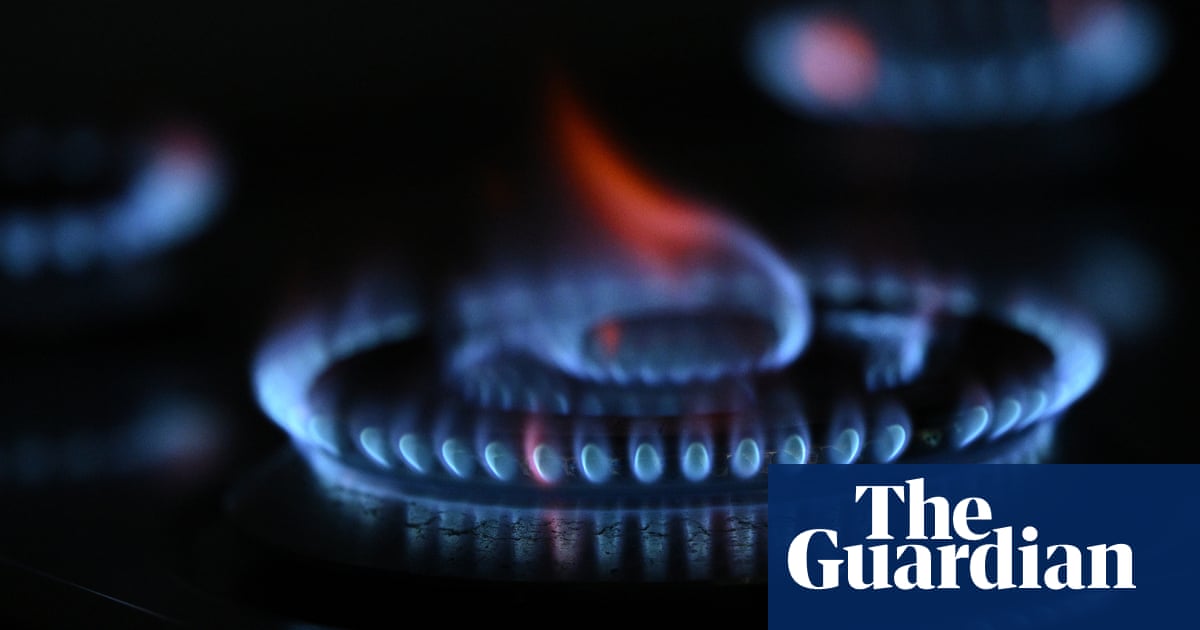
A new deal between the federal government and the gas giants Woodside and Esso will see 260 petajoules supplied to gas-fired power stations in Australia’s southeast coast until 2033 under an enforceable supply commitment as part of the gas code. It follows a commitment announced in November by the energy minister, Chris Bowen, and the resources minister, Madeleine King, that APLNG and Senex will deliver up to 300 petajoules by 2030, with 140 petajoules due by the end of 2027. Under the Albanese government’s gas code, energy companies are exempt from the price cap on gas of $12 a gigajoule for the domestic market if they agree to supply commitments to the east-coast market.
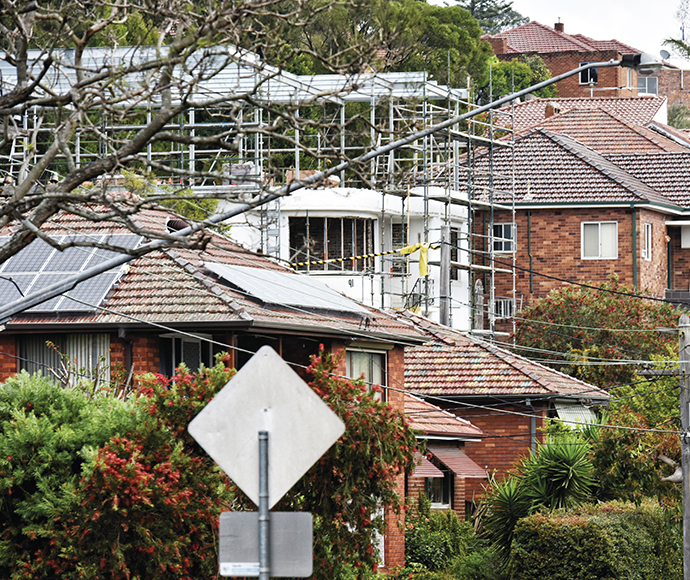
The Federal and NSW Governments have announced a $206 million package for energy-saving upgrades to 30,000 social housing properties, including access to solar for low-income renters and apartment residents.
QLD Premier Steven Miles has announced the government had committed $179 million to expand the local network-connected batteries program. The scheme, first announced in 2021, works by harvesting solar energy collected by rooftop panels during the day and storing it in communal, grid-sized batteries.
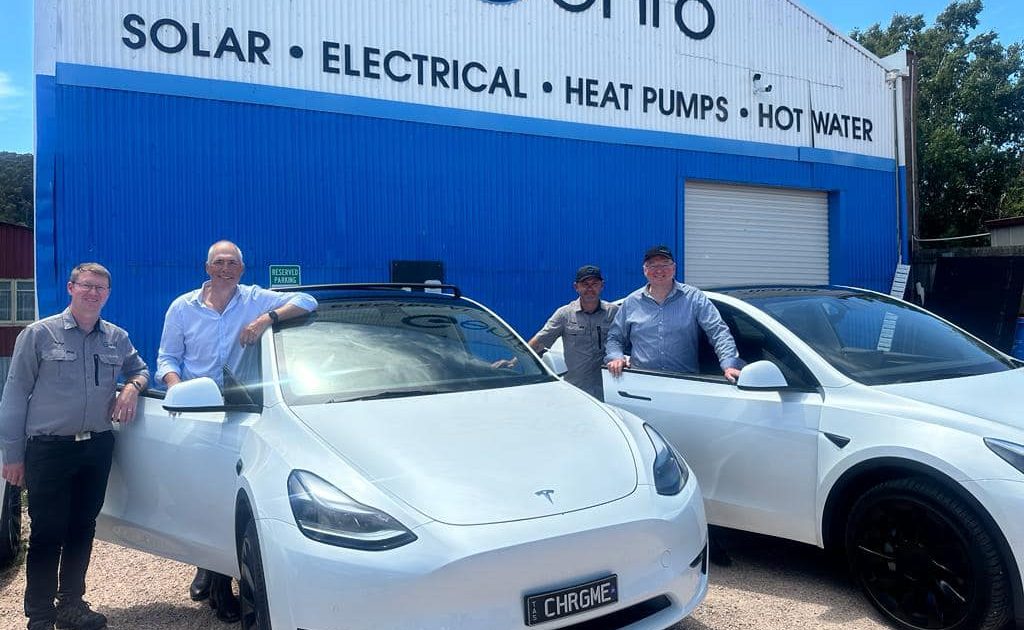
With the ambition of killing two birds with one stone, the Tasmanian Government has announced a $50 million expansion of its Energy Saver Loan Scheme. It’s hoped this will incentivise more households and businesses to use these no-interest loans to purchase energy efficient products, now including EV charging infrastructure.
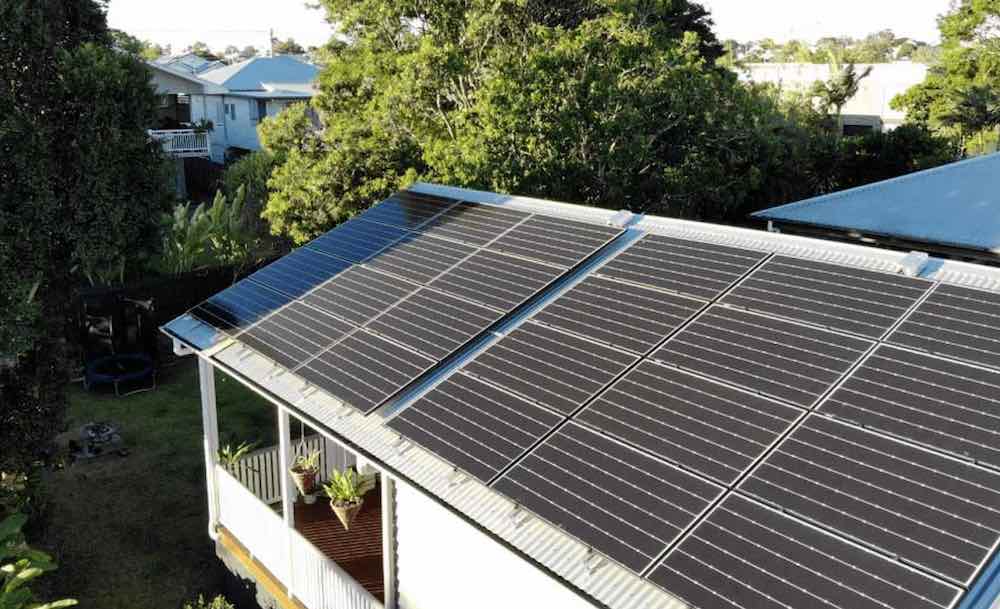
Increasing uptake of electric vehicles and home batteries – or at least an increase in the number of households planning to buy an EV or invest in home battery storage – has helped to deliver Australia’s second-biggest year for rooftop solar growth yet, new data confirms.

EnergyAustralia has suffered a $1.1 billion write-down mostly due to skinnier margins on retailing electricity and gas, increased competition and a higher cost of capital.
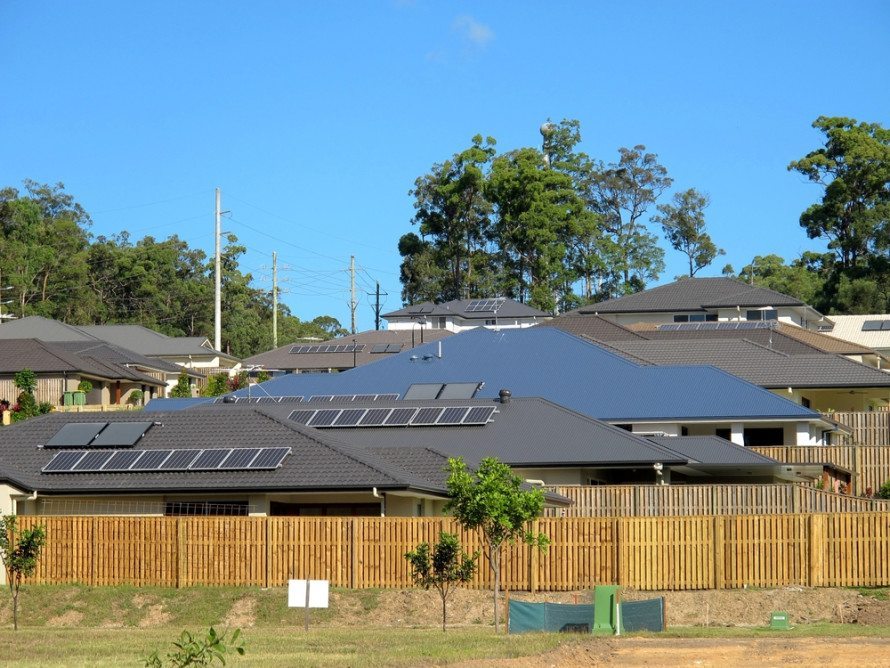
NSW government has expanded its offer for low-income households in the state to swap their energy rebate for a free, fully installed 3kW rooftop solar system. The Rebate Swap For Solar offer, announced on Monday, invites eligible households across the state to exchange a payment of $285 a year for long-term savings on their electricity bills of up to $600 a year, generated by rooftop panels.
Allan Fels takes particular aim at the energy industry in his Price Gouging Report for the ACTU. "The electricity industry is riddled with questionable prices," Professor Fels said.
No matter how much attention you pay to finding the best-priced plan, you can further minimise your bills by minimising your consumption.
That's where Bill Hero's energy efficiency side-kick Energy Coach steps in.
Read our current February issue of the Energy Coach newsletter for actionable tips and tricks to minimise your energy consumption through the hot month of February.

Here’s a recent review from another happy Bill Hero subscriber.
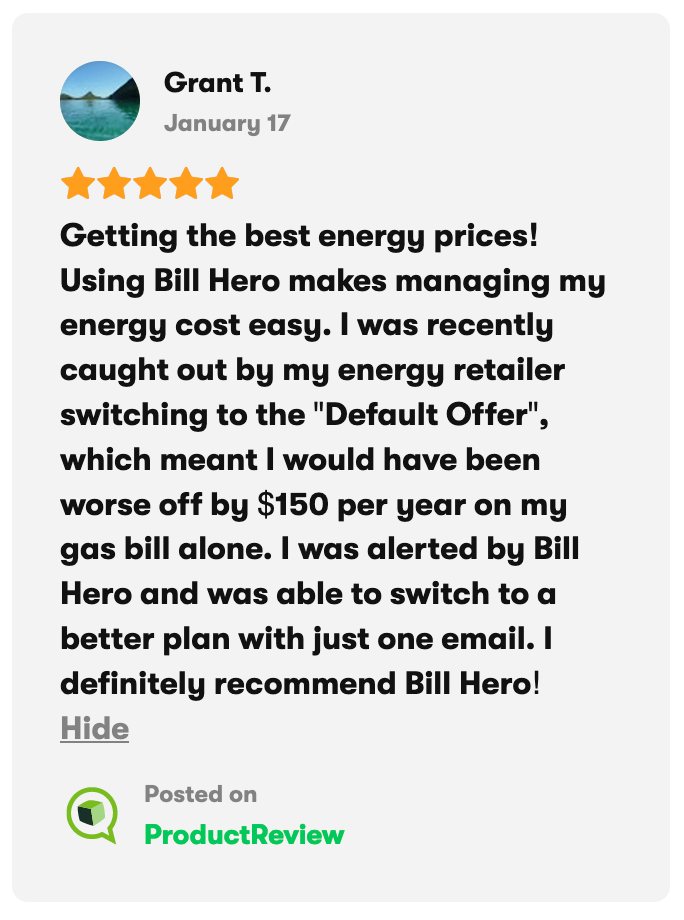
We're thrilled to see that our first Bill Hero subscribers have left us a video testimonial!
Thanks very much to Beverley in La Perouse, NSW, for taking the plunge and leaving a video testimonial for Bill Hero!
Are you also a happy Bill Hero subscriber? Are you looking for fame and fortune via internet video!? It's easy to make your own video testimonial!
Got opinions about the Price Gouging Inquiry? Or AGL's profits? Have your say in the comments, but please first read and understand our Community Guidelines.

Savings as a Service is the blog site and newsletter from Bill Hero. Subscribe now and get your energy savings tips and information delivered fresh to your inbox every month.